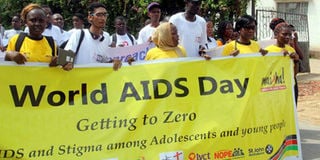Stigma, discrimination hinder fight against HIV/Aids

Locals during this year's World Aids Day celebration at Mombasa Technical University on December 1, 2015. Stigma and discrimination against people with Acquired Immune Deficiency Syndrome (Aids) has been cited as the biggest challenge in the fight against the scourge in northeastern region. PHOTO | LABAN WALLOGA | NATION MEDIA GROUP
What you need to know:
- Speaking at Garissa Primary during this year’s World Aids Day, northeastern regional HIV coordinator Omar Mwanjama said that because people from the region do not want to accept that HIV was real, it has hampered the campaign against the disease.
- The HIV prevalence rate in the region according to NACC data of 2014, Garissa has a prevalence rate of 2.1, Mandera 1.7 while Wajir stands at 0.2. New infections in Garissa County stands at 150 annually.
- Speaking at the same function, woman representative Shukran Gure who was the chief guest urged the residents to stop stigmatising people who have been infected by HIV noting that women were the most affected.
Stigma and discrimination against people with Acquired Immune Deficiency Syndrome (Aids) has been cited as the biggest challenge in the fight against the scourge in northeastern region.
Speaking at Garissa Primary during this year’s World Aids Day, northeastern regional HIV coordinator Omar Mwanjama said that because people from the region do not want to accept that HIV was real, it has hampered the campaign against the disease.
"Due to this, HIV/AIDS is on the increase in this region. It is declining in other regions because people have accepted it is real," he said.
According to the Nacc 2014 prevalence data, Garissa has a prevalence rate of 2.1, Mandera 1.7 while Wajir stands at 0.2. New infections in Garissa County stands at 150 annually.
Mr Mwanjama said that this was alarming putting into consideration of the low HIV knowledge in the region.
He further cited some major HIV hotspots within the three counties of Garissa, Wajir and Mandera which he said have to be addressed "so that we can close the gap of new infections".
Speaking at the same function, woman representative Shukran Gure who was the chief guest urged the residents to stop stigmatising people who have been infected by HIV noting that women were the most affected.
"It is very unfortunate that our people are yet to accept that Aids scourge is here with us. I am appealing to all to stop this stereotypes and misconceptions and embrace those who have been infected and affected so that we can bring the figure down as a region," she said.
She said as a professional nurse, she had handled Aids victims before and witnessed how people living with the disease are isolated from the society.





